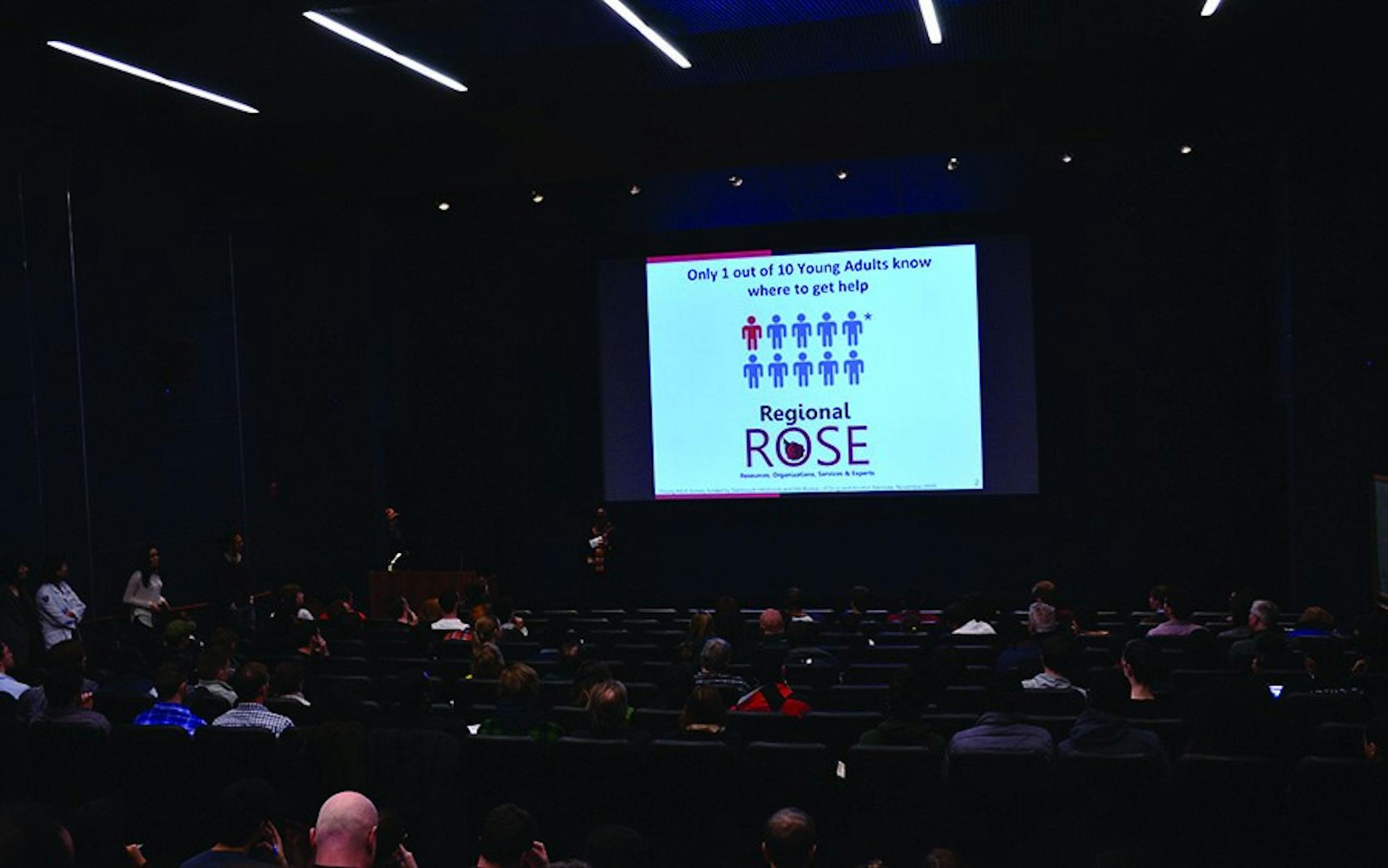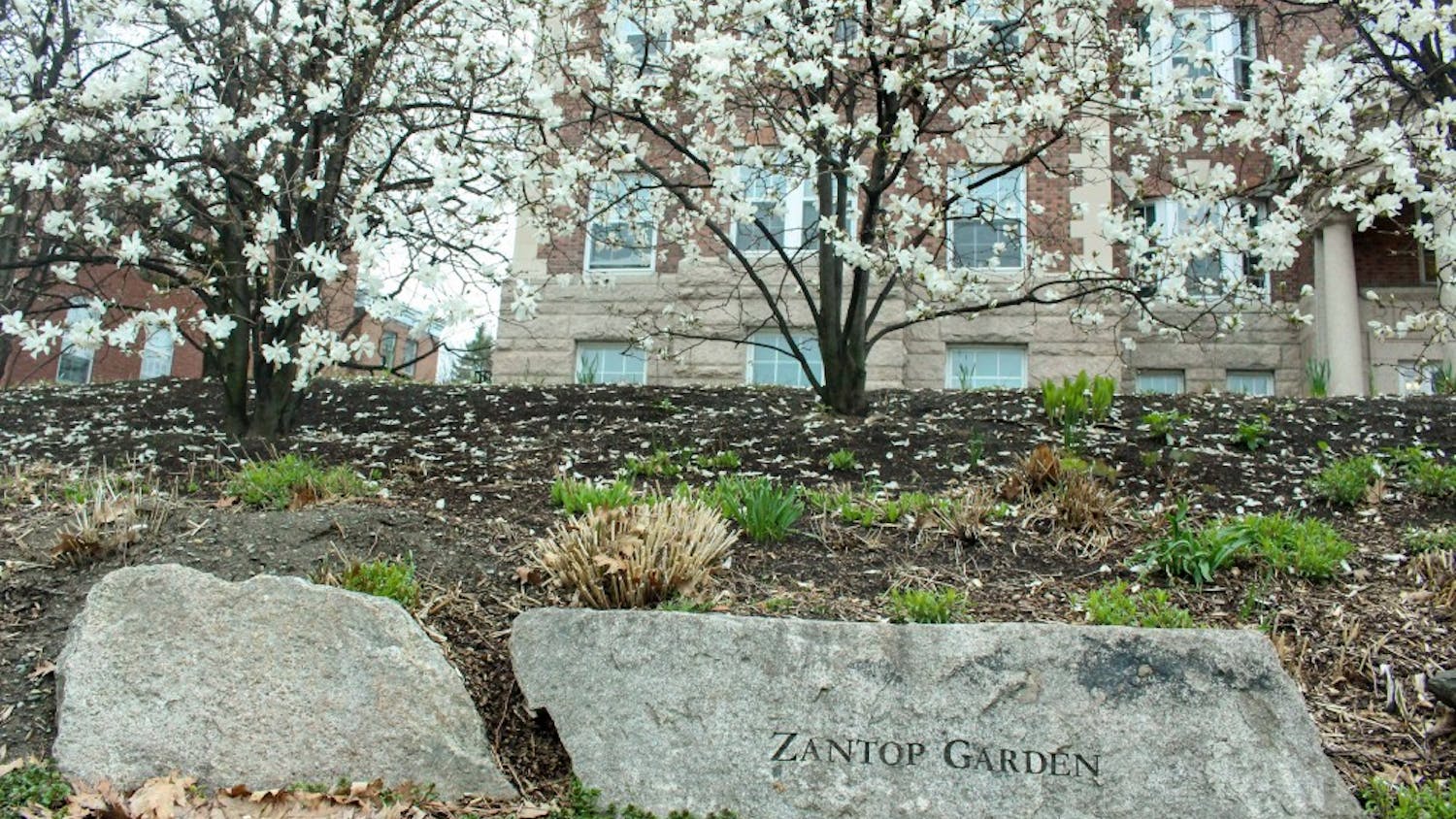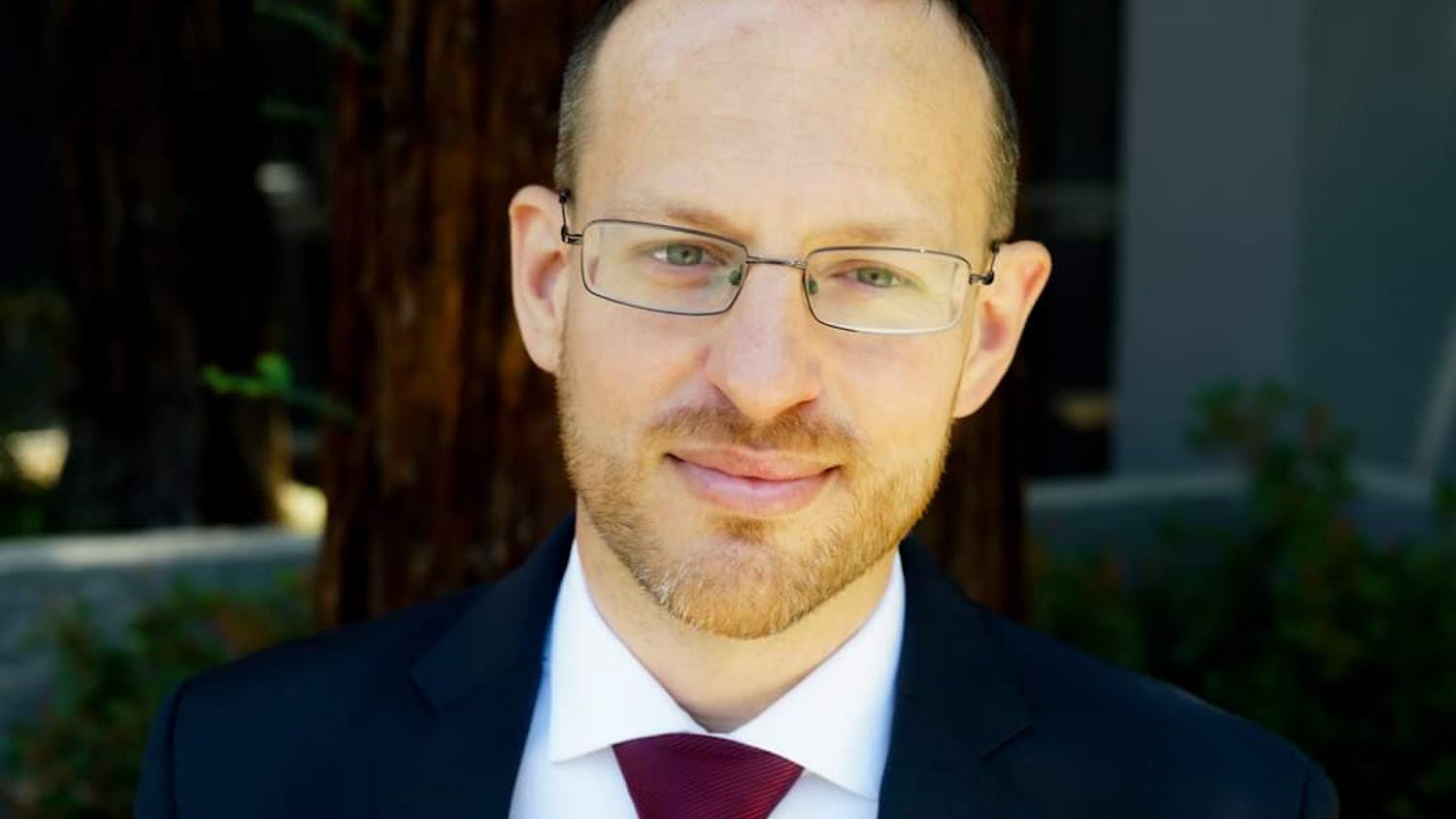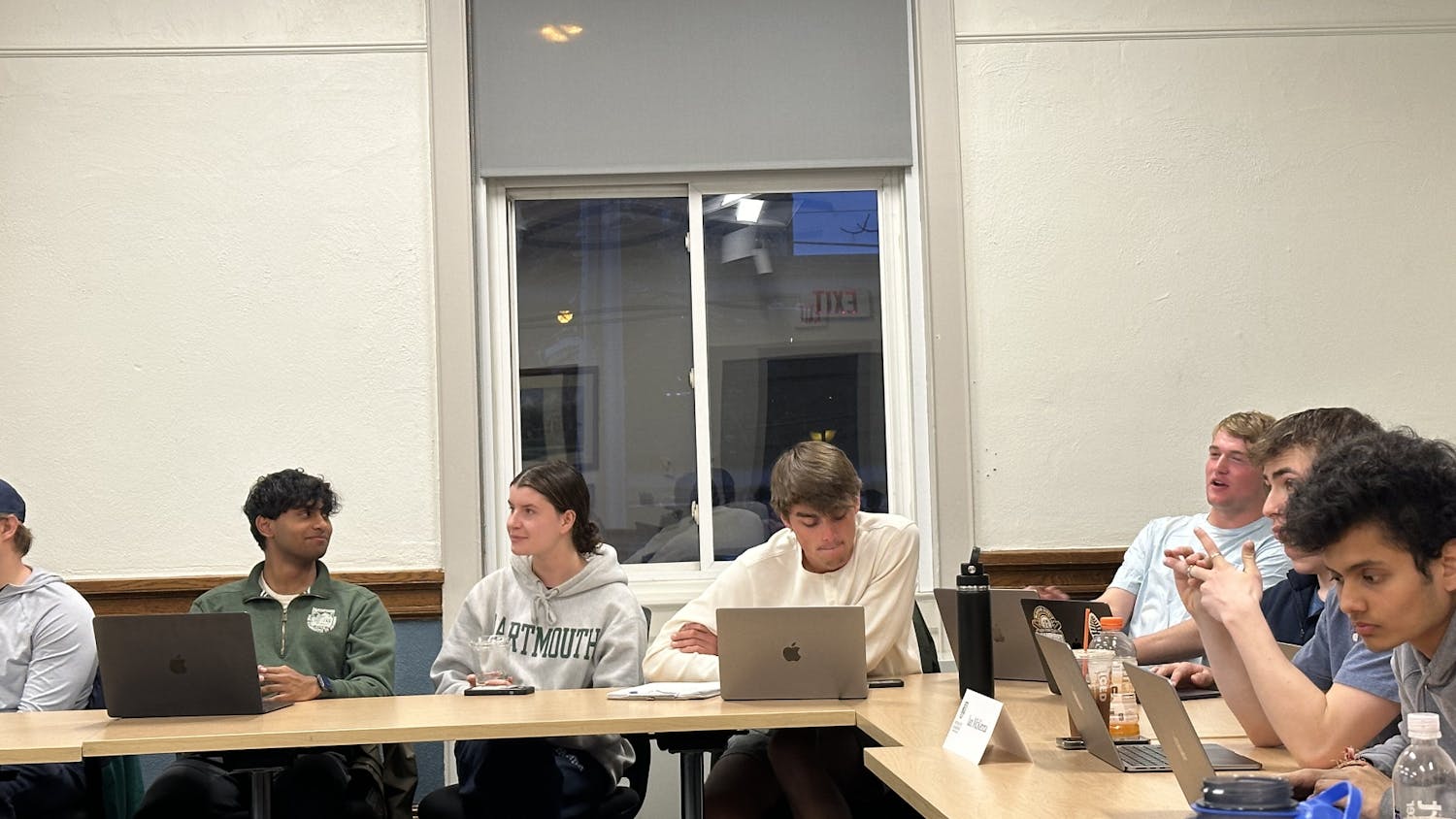Last night, Dartmouth’s very own shark-tank style, entrepreneurial show, The Pitch, was held at Loew Auditorium from 7 to 9 p.m. The event attracted dozens of audience members as 20 groups pitched their start-up ideas to a panel of six judges.
Out of the 20 participating groups, four winning groups were selected: FoodShare, Lodestone Biomedical, Heartstring and PukePocket.
Audience members were given ballots before the event began, and throughout the event they marked their three favorites. After a 40-minute pitching session, a 20-minute intermission followed, during which the judges decided the winners and the audience’s votes were tallied.
Winning teams will receive funding from the Dartmouth Entrepreneurial Network Innovation Center to further develop their projects, which along with Digital Arts Leadership and Innovation Lab, sponsored the event.
FoodShare, which earned first place, will receive $3,000. They developed an app that transforms restaurants into social enterprises — every time a user dines at one of the FoodShare-partnered restaurants, FoodShare donates a meal to someone in need. Users must first take a photo of their meal and are also prompted with the option to recommend that restaurant to their friends or share their experience on social media to donate an additional meal.
FoodShare co-founder and COO Aidan Folbe ’19 said he and his team are excited to bring FoodShare to Hanover. Folbe co-founded FoodShare with Andrew Glantz, a junior at Washington University in St. Louis where the two launched the program in October.
“We really think that, with the small, tight-knit community around here and the students, we can definitely make a difference,” Folbe said. “We can start feeding people who need to get fed and help those in need.”
FoodShare will use the funding from DEN to develop an Android version of the app that will expand the scope of the project, Folbe said. He said they will also use the money to do more marketing and improve their website.
Second place Lodestone Biomedical, which will receive $2,000, has designed a product called Iron-Wand that is capable of detecting iron deficiencies in a fast and simple way.
Co-founder and CEO Lidia Valdés ’14 Th’15 said she and her team are now looking to 3D-print the clinical device and get market feedback.
Third place and $1,000 went to Heartstring an app that adds soundtracks to videos and pictures, creating music specifically for social media.
The people’s choice award went to PukePocket, which designed an innovative pouch for vomiting patients on ambulances. PukePocket also won $2,000.
In addition to the funding from DEN, DALI will also offer design and development help to the winning projects.
“They’re eligible to have a DALI team work on their project and develop a prototype,” DALI Lab executive director Lorie Loeb said.
Tim Tregubov, technical director and co-founder of DALI, said that winning teams are offered at least one term with a DALI team, consisting of designers and developers, to help with their project.
Loeb said that non-winning groups may also apply for support from the DALI Lab.
In the past, winning groups have gone on to form companies with the money they received from The Pitch. However, Loeb said that some projects fall apart.
“Entrepreneurship takes a lot of tries,” she said. “Here’s a chance for people to try it.”
She said that some participate in The Pitch more than once, and each time, pitches only get better.
The Pitch was started in spring of 2014, with next term marking its second-year anniversary.
The Pitch has improved in terms of publicity, Loeb said, adding that this term there has been a more diverse pool of applicants. She also said that there are more Tuck School of Business students this term compared to previous terms. Loeb said that the participants usually include a balance of faculty, staff, undergraduate students and graduate students from Tuck, the Thayer School of Engineering and the Geisel School of Medicine who participate.
Director of entrepreneurship at the College and DEN director Jamie Coughlin said the motivation behind the creation of The Pitch was to create a venue of ideas in which students, faculty and staff could have an opportunity to take an idea and present it to the audience.
He said that this allowed people to practice how to articulate a vision, receive resources for venture and software development from DEN and DALI, respectively.
Tregubov said that participating in The Pitch is a learning experience for every group.
“Even for the teams that don’t win, there’s a lot of value in just putting yourself out there, getting up in front of an audience and talking about your idea,” Tregubov said.
Participants have two minutes to pitch their idea to judges and the audience. The two-minute model of The Pitch can be a learning experience, Coughlin said, because it allows participants to gain experience in synthesizing ideas and translating them in ways the audience can understand in a short time frame.
Loeb said that DALI desires to foster an atmosphere of creativity around campus, and have people see themselves as “idea people.”
Coughlin said that The Pitch gives people full exposure to a spectrum of ideas, industries and environments.
“Entrepreneurship is about a mindset, a way of thinking that applies to all different settings and environments,” Coughlin said.
The amount of energy at the event is contagious and inspiring, Tregubov said. He added that there is a great synergy in the collaboration between DALI and DEN when it comes to The Pitch.
Prior to the event every term, both DALI and DEN provide preparation support for participating groups. DALI has open lab hours every Monday night and DEN holds a pitching workshop and clinic.
“Whenever you’re talking about an idea, the important part is the story,” Tregubov said.
He said that wrapping the problem in the form of a story is more effective than just describing the problem or showing the product.
This term, 47 groups applied to The Pitch, which takes place fall, winter and spring terms. Groups may begin applying a month before the actual event. Videos of past pitches are posted on YouTube.
Audience members commented on how concrete this terms pitches were. Deven Orie ’19 said that the pitches from the fall were much more conceptual, while people this term had already built an actual product. Aditi Phatak Gr’17 agreed and said she thought all the pitches were well prepared with good ideas and real business models.
“They came with existing infrastructure, which was great to see,” Phatak said. “I really liked that they were so well-thought-out.”
Many of the start-ups presented today have the potential to succeed in the marketplace, Ebenezer Bulcha ’19 said.
“The competition is definitely on the rise,” he said. “I can’t wait to pitch my own idea come spring.”
Sonia is a junior from Ottawa, Canada. (That is the mysterious Canadian capital that no one seems to ever have heard of.) She is a double major in Economics and Government, with a minor in French. She decided to join The D’s news team in her freshman fall because of her love of writing, talking to people, getting the most up-to-date news on campus, and having a large community of fellow students to share these interests with.




